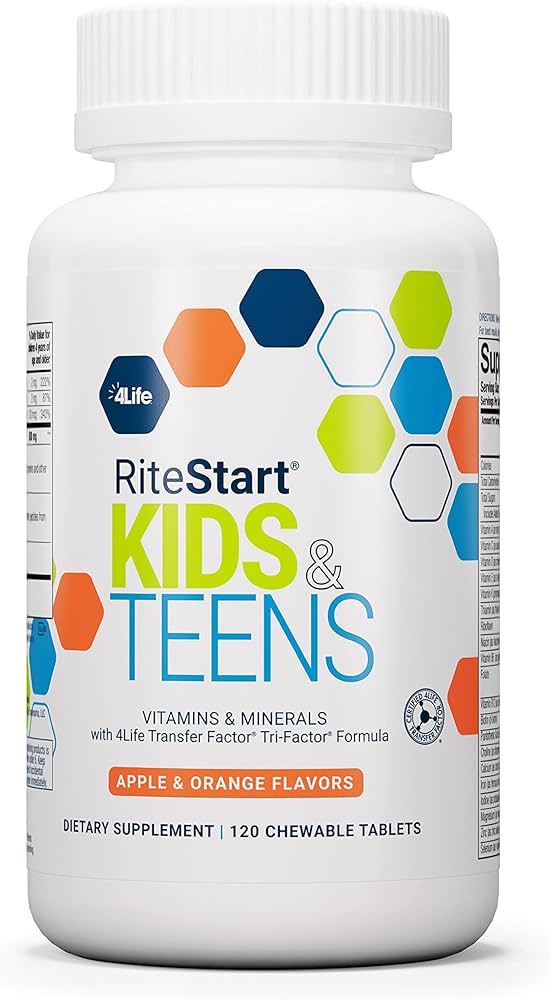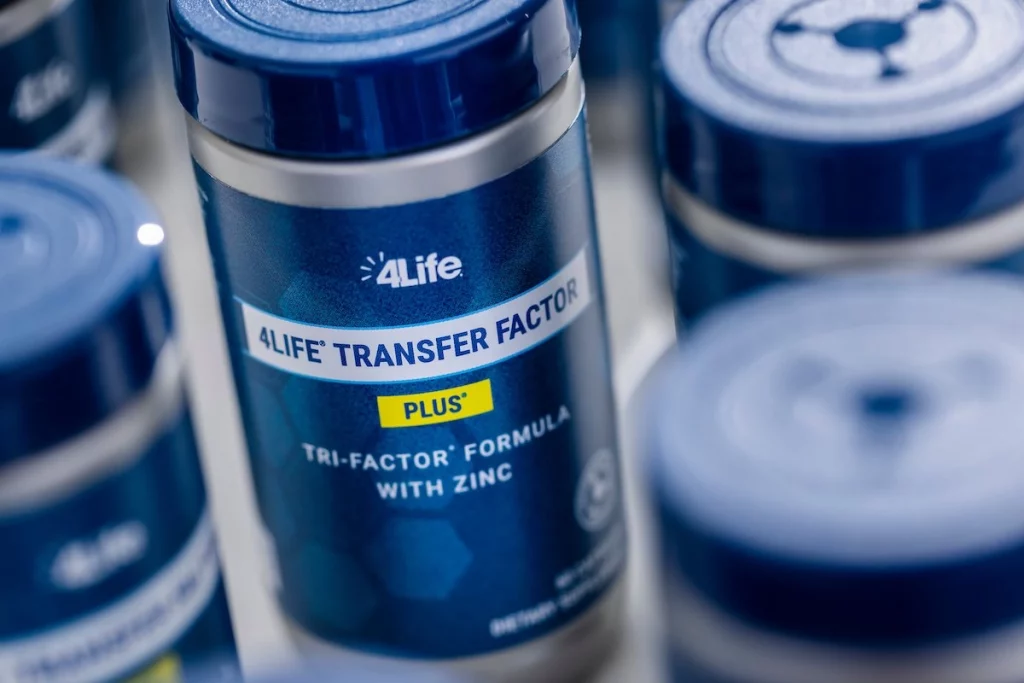
As parents, our primary concern is our children’s health and well-being. From the moment they enter the world, the strength of their immune system plays a critical role in their overall development and the quality of life they lead.
Understanding the complexities of children’s immune system development is crucial. With ongoing changes in environmental factors and dietary habits, it’s more important than ever to know how to boost a child’s immunity naturally. This blog will explore effective strategies and the best practices to ensure your child thrives.
We aim to provide comprehensive insights on the best vitamins for children’s immune systems, as well as the importance of supplements for kids. Whether you’re dealing with allergies in children and immune support or concerned about the effects of diet on a child’s immunity, this guide will equip you with knowledge and practical tips to navigate these challenges effectively. Learn about safe supplements for children, including 4Life Kids supplements, and how they can be part of your child’s health regimen.
Our goal here is to give you all the necessary tools and knowledge to make informed decisions about buying children’s immune support vitamins and choosing the right organic immune boosters for kids. Whether you’re looking for probiotics for kids’ immune health or seeking the best discounted children’s vitamins, you’ll find valuable information here. By the end of this blog, you’ll be well-prepared to enhance your child’s immune health with children’s natural health supplements, like the 4Life Transfer Factor for kids, ensuring they have the best possible defense against common health threats.
Stay here as we delve deeper into how you can safeguard your child’s health with the right nutrients and lifestyle adjustments. The process of effectively and naturally boosting your child’s immunity begins here.
Understanding Children's Immune System

The immune system of children is quite different from that of adults, which is why for the little ones in our household, we must understand that their immune development is a gradual process that requires specific attention. Unlike adults, children are in the midst of developing their bodily defenses, making them more susceptible to infections. Various factors such as genetics, nutrition, and environmental exposure influence this development.
Nutrition is critical for a child’s immune system development. Essential nutrients like vitamins, minerals, and probiotics are crucial for fostering robust immune responses. Children require vitamin D to activate their immune defenses, and they can obtain sufficient levels through diet, supplements, or adequate sunlight exposure.
Environmental factors, such as exposure to germs, can actually help strengthen the immune system by teaching it to fight off infections. However, excessive cleanliness might limit these necessary exposures, potentially slowing immune system maturity.
Signs of a Weak Immune System
Recognizing the signs of a weak immune system can help parents act swiftly to address potential issues. Common indicators include:
Frequent and prolonged infections:
If a child catches colds or other infections more often than peers or takes longer to recover, it could be a sign of a weakened immune system.
Fatigue
Children are naturally energetic. Regular, unexplained tiredness may indicate that their body is overworking to fight off infections.
Frequent stomach troubles
Issues like diarrhea, nausea, or long-term constipation can indicate poor immune function, especially if linked with food sensitivities or allergies.
Poor growth
If a child isn’t growing or gaining weight in line with healthy standards, it might be due to an insufficient immune response impacting their overall health.
Educating yourself on these signs and maintaining a dialogue with healthcare providers can ensure that your child receives appropriate care, including possibly integrating children’s health multivitamins or immune boosting supplements like 4Life Transfer Factor for kids into their daily regimen
Recognizing and responding to the signs of a weakened immune system, along with providing proper nutritional support through safe supplements for children, are essential steps in promoting your child’s health and development. By understanding and supporting their immune health early, parents can help pave the way for a lifetime of better health.
The Role of Supplements in Enhancing Immunity
Supplements can be a valuable tool in supporting a child’s immune system, especially when natural dietary intake falls short. While a balanced diet is the best way to obtain necessary nutrients, certain circumstances might make supplementation necessary to ensure that children receive all the essential vitamins and minerals their bodies require for optimal immune function. Here, we explore when it might be appropriate to introduce supplements into a child’s diet and how to choose the safest and most effective products available.

When Supplements Are Needed
Supplements can play a crucial role in filling nutritional gaps and supporting the immune system, especially in scenarios where dietary intake might not be sufficient. Supplements may be especially beneficial in the following situations:
Dietary Gaps
Not all diets provide complete nutrition, especially for children who are picky eaters or have dietary restrictions (e.g., vegan diets that may lack sufficient Vitamin B12).
Specific Health Conditions
Children with certain health conditions that affect nutrient absorption, such as celiac disease or Crohn’s disease, may require supplements to meet their nutritional needs.
Enhanced Immune Support:
During the cold and flu season, supplements like vitamin C and zinc may provide additional immune support to help ward off illnesses.

Choosing safe and effective supplements
Selecting the right supplements involves more than just picking a product off the shelf. Here are some tips to ensure that the supplements you choose are safe and effective:
Ingredient Transparency
Look for supplements that clearly list all their ingredients, including active and inactive components. This transparency helps you avoid products with unnecessary fillers or potential allergens.
Clinical Backing: Select supplements backed by scientific research:
Reputable brands will often provide references to clinical studies that demonstrate the efficacy of their products.
Choose supplements with quality certifications:
from third-party organizations like NSF International or the US Pharmacopeia (USP). These certifications indicate that the product meets high standards for safety and quality.
Consult healthcare providers:
Before starting any new supplement, especially for children, consult with a pediatrician or a healthcare professional. Your child’s specific health needs and conditions can be the focus of their guidance.
Parents can effectively enhance their children’s immune health while ensuring safety and efficacy by understanding when supplements are necessary and how to choose them wisely.
Spotlight on 4Life’s Children Supplements
4Life meticulously designs a specialized range of children’s health supplements to meet the unique nutritional needs of growing children. These products stand out for their safety and formulation, with each supplement undergoing rigorous quality tests to ensure they are safe and effective for children’s consumption. We carefully select the ingredients in each supplement to support not only the immune system but also the overall development of children.
Benefits of 4Life Kids Supplements

4Life specifically formulates their children’s supplements to provide comprehensive immune health support. A standout product in this line is the 4Life Transfer Factor for kids, which includes transfer factors—molecules that help educate and strengthen the immune systems of children, enhancing their ability to recognize, respond to, and remember health threats more effectively. This innovative approach ensures that children are not only better equipped to handle common illnesses but also have a solid foundation for long-term health.
Incorporating 4Life supplements into the daily routine of children can significantly bolster their natural defenses, supporting not just their physical health but also their overall well-being. This makes them a trusted choice for parents looking to ensure robust protection against the health challenges their children may face as they grow.
RiteStart® Kids & Teens
For kids ages 2 and up, RiteStart Kids & Teens is more than just a “rite” start to the day; it’s the “rite” foundation for a healthy life. Each delicious, chewable tablet provides comprehensive nutritional support to promote immune system wellness, sustain healthy energy levels, support bone development, and maintain healthy muscle, vision, skin, and brain function. This advanced formula includes 22 essential vitamins and minerals, such as the antioxidant vitamins A, C, and E, as well as the vital nutrient choline for optimal brain health. What sets this quality product apart is the inclusion of 4Life Transfer Factor® Tri-Factor® Formula, which helps immune system cells more effectively recognize, respond to, and remember potential health threats. Recent studies done in separate labs have shown that core 4Life Transfer Factor® products increase the activity of Natural Killer (NK) cells when they sense a health threat. These products also activate other immune system cells, such as B cells and T cells.
RiteStart Kids & Teens gives kids ages 2 and up more than just a “rite” start to their day; it’s the “rite” start to a healthy life.
- Supports strong bones, muscle function, and healthy vision*
- Contains 22 essential vitamins and minerals*
- Includes B vitamins for healthy brain function and healthy energy levels*
- Bolsters Natural Killer cell activity in the presence of a health threat while activating a variety of other immune system cells*
- Contains choline, which is vital in supporting healthy brain function*
- Provides essential vitamins and minerals to help ensure kids and teens receive the nourishment they need for proper growth and overall health*
- Comes in apple and orange chewable tablets
- Contains 4Life Transfer Factor for immune system support*

RiteStart® Kids & Teens
- Contains 4Life Transfer Factor, which is clinically proven to activate the immune system within two hours1*
- Supports strong bones, healthy muscle function, and healthy vision*
- Contains 22 essential vitamins and minerals*
- Includes B vitamins and the essential nutrient choline for healthy brain function*
- Provides healthy energy support*
- Promotes long-term health and wellness*
- Provides essential vitamins and minerals to help ensure kids and teens receive the nourishment needed for proper growth and overall health*
Common childhood illnesses and Immune Support
The prevention of common illnesses such as colds and the flu in children can greatly benefit from a well-rounded approach that includes proper nutrition and the use of supplements. Key strategies include:
Balanced Diet:
Ensuring that children eat a balanced diet rich in fruits, vegetables, whole grains, and lean proteins provides the vitamins and minerals necessary for a strong immune system. Foods high in vitamin C (like oranges and strawberries) and zinc (such as nuts and seeds) are particularly effective at bolstering the body’s defenses.
Supplementation:
During seasons when children are more susceptible to illness, supplements like vitamin D and probiotics can provide an additional layer of protection. Vitamin D is crucial for immune function, especially in regions with limited sunlight during winter, while probiotics help maintain a healthy gut flora, which is vital for immunity.
Simple hygiene practices:
such as regular hand washing and teaching children to cover their mouths when coughing or sneezing, can also help reduce the spread of viruses and bacteria.
Handling Allergies and Autoimmune Disorders
Allergies and autoimmune disorders in children can often be managed and mitigated through dietary adjustments and supplements, alongside traditional medical treatments:
Allergy Management
Identifying and avoiding allergens is key, but nutrition can also play a supportive role. Foods rich in omega-3 fatty acids (like fish and flaxseeds) are known for their anti-inflammatory properties and may help reduce allergic reactions.
Autoimmune Support
For autoimmune conditions, a diet low in processed foods and sugars while rich in antioxidants can help reduce inflammation. Supplements such as omega-3 fatty acids and vitamin D might also be beneficial, as they help modulate the immune system and reduce inflammatory responses.
Consultation with Professionals:
It’s important for parents to work with pediatricians and dietitians to tailor dietary plans that fit the specific needs of children with allergies or autoimmune disorders. These professionals can also recommend appropriate supplements that won’t interfere with other treatments.
By integrating these nutritional and supplemental strategies, parents can help support their children’s immune systems against common illnesses, allergies, and autoimmune disorders, contributing to their overall health and wellbeing.
Key Insights on Enhancing Children's Health and Immunity
One of our most important roles as parents is to ensure that our children grow up healthy and strong. This involves more than just handling illnesses as they come; it requires a proactive approach to their overall health and immunity. From the nutrients they consume to the habits we help them develop, every aspect plays a crucial role. Here are ten essential insights that can guide you in nurturing your child’s health effectively, ensuring they have the best start in life possible. These principles cover a wide range of topics, from the importance of a balanced diet and the strategic use of supplements to the value of physical activity and proper healthcare consultation.

1. Essential Nutrients Are Crucial
Vitamins, minerals, and probiotics play pivotal roles in developing and strengthening a child’s immune system.
2. Supplements fill dietary gaps
- They can be beneficial in providing the necessary nutrients that might be missing from a child’s daily diet, especially in cases of dietary restrictions or specific health conditions.
3. Safe Supplement Practices
It’s important to choose supplements that are safe and specifically formulated for children, with clear labeling and quality certifications.
4. Importance of a Balanced Diet
A diverse and balanced diet rich in fruits, vegetables, whole grains, and lean proteins is foundational for good health and proper immune function.
5. Educating Children on Healthy Habits
Encouraging kids to cook and participate in educational activities can teach them the value of a healthy diet and lifestyle.
5. Educating Children on Healthy Habits
Encouraging kids to cook and participate in educational activities can teach them the value of a healthy diet and lifestyle.
6. Regular Physical Activity
Encouraging regular exercise helps boost children’s immune systems and overall health.
7. Monitoring Health Changes
Parents should be vigilant for signs of weak immune systems, such as frequent illnesses or fatigue, which could indicate nutritional deficiencies or other health issues.
8. Professional Guidance is Key
Consulting healthcare providers can ensure that any supplement or major dietary change is appropriate and beneficial for the child’s specific needs.
9. Hygiene Practices
Basic hygiene practices are complementary to nutritional efforts in preventing common childhood illnesses like colds and flu.
10. Long-term Health Foundation:
Establishing healthy habits in nutrition and lifestyle from a young age sets the foundation for a lifetime of good health.
Children's Health and Immunity
What are the key nutrients for boosting a child's immune system?
Essential nutrients that boost a child’s immune system include vitamin C, vitamin D, zinc, and probiotics. Vitamin C is a powerful antioxidant that supports various cellular functions of both the innate and adaptive immune systems. Vitamin D is crucial for immune function and bone health, while zinc is necessary for immune cell function and cell signaling. Because the gastrointestinal tract actually houses a large part of the immune system, probiotics help maintain a healthy gut microbiome, which is vital for immunity.
How can diet influence a child's immune response?
A child’s diet significantly influences their immune response. Diets rich in fruits, vegetables, whole grains, and lean proteins provide essential nutrients that help build and support the immune system. Foods high in antioxidants and other anti-inflammatory compounds can help reduce chronic inflammation, allowing the immune system to function more efficiently and respond more effectively to infections.
What are the most prevalent illnesses in children, and how can we prevent them?
Common childhood illnesses include the common cold, influenza, chickenpox, and ear infections. Prevention strategies include maintaining good hygiene practices such as regular handwashing, ensuring up-to-date vaccinations, and keeping a healthy diet rich in immune-supporting nutrients. Regular physical activity and adequate sleep are also critical in preventing these illnesses because they keep the immune system strong.
When should children start taking supplements, and are they safe?
When used appropriately and under the guidance of a healthcare provider, supplements can be safe for children. When diet alone cannot meet a specific nutritional need, such as vitamin D deficiency or iron deficiency anemia, we should introduce supplements. Selecting supplements designed specifically for children and devoid of harmful additives is crucial.
How does vitamin C benefit a child's immune health?
Vitamin C helps a child’s immune system function by supporting various cellular functions. It helps protect cells from oxidative stress and supports the barrier function against pathogens. Vitamin C also stimulates the production of white blood cells, which are key to fighting infections.
What role does vitamin D play in children's immune function?
Vitamin D is critical for children’s immune function because it modulates the immune response. It helps activate T cells that detect and destroy pathogens. Adequate vitamin D levels are associated with a lower risk of respiratory infections among children.
Can probiotics help enhance a child's immune system?
Yes, probiotics are beneficial in enhancing a child’s immune system by maintaining a balanced gut microbiota, which is crucial for a healthy immune system. Probiotics can help reduce the frequency and duration of infectious diseases, particularly gastrointestinal and respiratory infections, by enhancing the gut barrier and modulating the immune response.
How often should children take immune-support vitamins?
The frequency with which children should take immune-support vitamins depends on their dietary intake and nutritional needs. Generally, a daily multivitamin that includes essential vitamins and minerals is safe for most children. However, a healthcare provider should assess specific needs, especially if higher doses of vitamins like vitamin D or zinc are being considered.
What are the signs of a weak immune system in children?
Children’s weak immune system is characterized by frequent and prolonged infections, fatigue, frequent diarrhea or constipation, and delayed growth. These symptoms suggest that the immune system may not be responding adequately to infections, which can lead to more frequent illnesses and longer recovery times.
How can parents naturally manage allergies in children?
Managing allergies in children naturally involves identifying and avoiding known allergens, improving dietary habits to support the immune system, and using supplements like omega-3 fatty acids, which can help reduce inflammation associated with allergic reactions. A diet rich in fruits and vegetables can also help modulate the immune response and potentially reduce allergic sensitivities.

